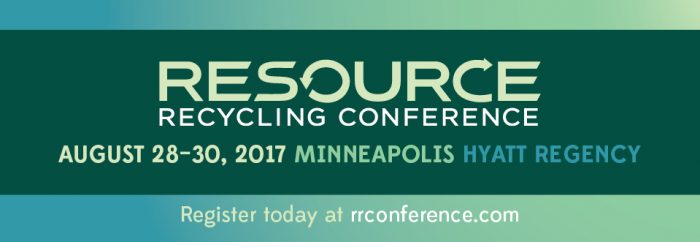
Jules Bailey, Oregon Beverage Recycling Cooperative
The 2017 Resource Recycling Conference will kick off in Minneapolis in less than two weeks. To continue to help readers gear up for the event, we’re offering another speaker profile.
This week we get to know Jules Bailey, chief stewardship officer and director of external relations for the Oregon Beverage Recycling Cooperative (OBRC), the stewardship group that manages Oregon’s container deposit program.
Bailey will speak on a panel on Aug. 29 called “Glass Acts” in which he’ll discuss OBRC’s development of a refillable glass bottle system.
What is the refillable bottle system OBRC is developing and how does it work?
At OBRC, we’re using the power of our BottleDrop collection system and our decades of experience with container processing to make a refillable beer and wine bottle system a reality. Refillable bottles are better for the environment, even when factoring water usage, and we’re able to tell a sustainability story that’s above and beyond the recycling we already do. During our first pilot phase, we’re partnering with Double Mountain Brewery to collect their beer bottles, which are already refillable, and return them to the brewery for washing at a contract facility. It’s a simple step, but it helps get the public to understand that there are refillable bottles in the marketplace.
Our next phase, launching at the end of this year, will be even more robust. We’re working with glass bottle manufacturer O-I to design and source a custom refillable bottle family that will become the standard for refillables in Oregon, and maybe even nationally. … OBRC will collect those bottles back through our BottleDrop network, and have them washed through our own bottle washing contract before sending them back to the brewery. We’ll also move quickly towards establishing our own wash line.
What barriers and opportunities are associated with the initiative?
We’ve had enormous interest from breweries already, which isn’t surprising. We think we’ll be able to deliver a major cost savings on the bottle, including all the handling and washing, while telling a great environmental stewardship story. It’s good for the bottom line, for marketing, and for the environment.
We’ve also enjoyed the opportunity to work closely with O-I on this project. Frankly, we never thought a glass bottle manufacturer would ever invest in such a venture, but that’s exactly what they’ve done. I think that speaks to the long-term opportunity here, and we’re thrilled to have them as partners.
Our biggest challenge is educating a marketplace that hasn’t seen refillables in a long time. Both for breweries and consumers, we have to address the quality and cleanliness issue first. These bottles come out cleaner than many brand new containers, but we have to make sure people know that and understand all the inspection that goes into each bottle. We also have to get consumers comfortable with a bottle that, while clean, may show a few scuffs from the love it’s gotten over its lifetime.
This is obviously a very unique program, as the largest bottle washing system in the country. Are there unique aspects of Oregon’s container deposit system that helped make this viable?
We like to say that what’s old is new again. Of course that means that we’re taking bottles that have been used, and making them as good, or better, than new.
But it is also a reference to the fact that refillable beer bottle programs used to be quite common in the United States. Changes in the beverage and grocery industries led to the decline and disappearance of these programs a few decades ago, in large part due to logistical issues related to collection, return and washing. In Oregon, because the container deposit system is privately run by a co-op of the beverage industry, we are vertically integrated across all aspects of container return and processing. We can balance costs and work without profit considerations at all steps of the process. We already have the BottleDrop collection network and we run trucks to every corner of the state. We’ve solved container return and processing, and the marginal cost of bolting this onto our system is low.
That’s why we can do all the collection and washing and still hold costs under new containers. It would be impossible to hold costs down if we had to pay fees or manage contracts at multiple steps in the chain, or if we didn’t have existing collection infrastructure. Beverage industry stewardship is what makes this a success.
What makes you most excited to be a part of the recycling industry right now?
I come from a sustainability background, and sometimes that can feel like nebulous policy. Recycling is tangible. Everybody consumes materials and makes a choice about what to do with those materials afterwards. Those materials represent millions of tons of embedded carbon, water consumption, resource use, toxins and byproducts.
At OBRC, we process over a billion containers a year. If we increase volume by 10 percent, we’ve just diverted 100 million containers from landfills or from our beaches and streams. That’s real impact.
Bailey will be joined by Ellen Martin of Closed Loop Partners and Lynn Bragg of the Glass Recycling Coalition in the “Glass Acts” session to be held Tuesday, Aug. 29. It will be moderated by Chaz Miller of the National Waste & Recycling Association.
The 2017 Resource Recycling Conference is set for Aug. 28-30 at the Hyatt Regency Minneapolis. Registration is now open. Act now to get the discounted conference hotel rate. Head to rrconference.com for all the latest on attending, exhibiting and sponsoring.


